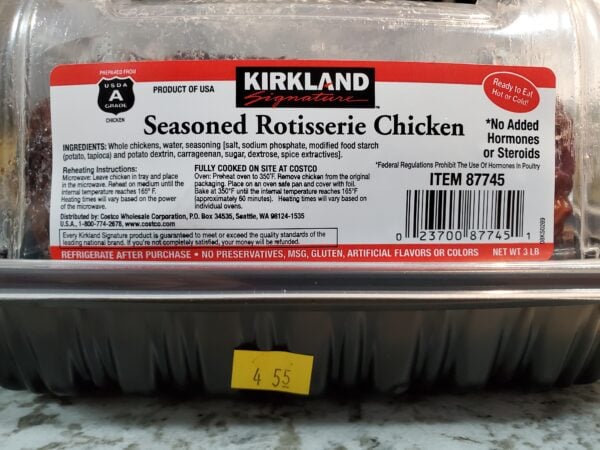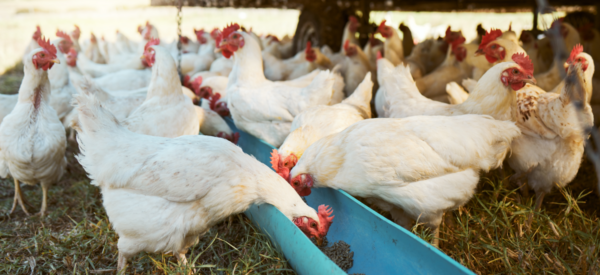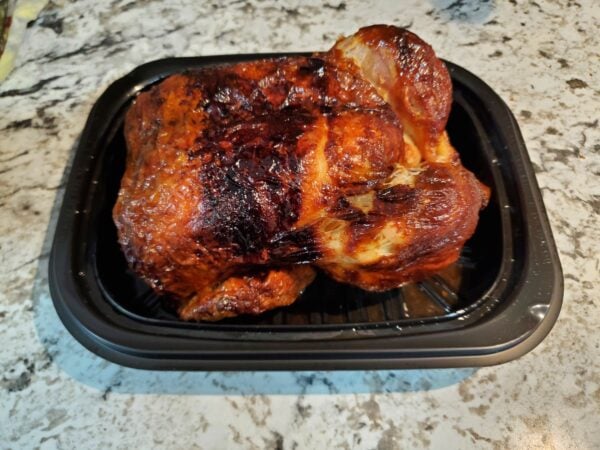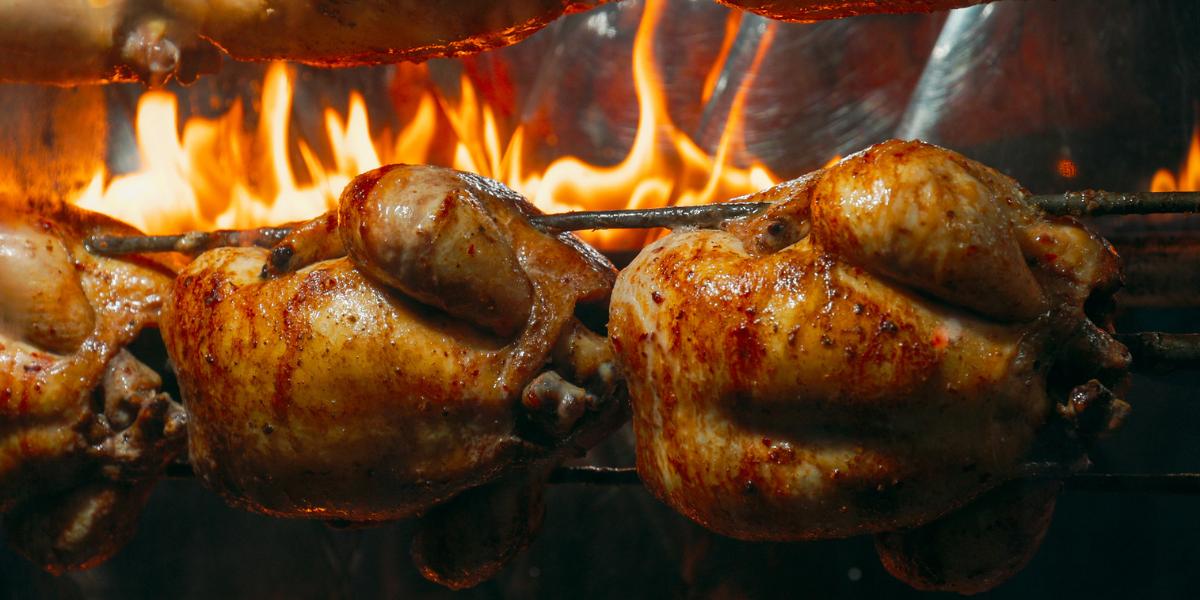Costco rotisserie chickens have taken the world by storm with their bulky breasts and $4.99 price tag. In fact, they are so loved that Costco reported selling over 117 million rotisserie chickens in 2022. The readily available, affordably priced chicken is touted all over the internet as a must-have grocery staple, and I have to admit that I have found myself under its spell a time or two. But is Costco rotisserie chicken gluten free?

What Are the Costco Rotisserie Chicken Ingredients?
The ingredients as listed on the rotisserie chicken label are:
Whole chickens, water, seasoning [salt, sodium phosphate, modified food starch (potato, tapioca) and potato dextrin, carrageenan, sugar, dextrose, spice extractives].
The label also says that there are no preservatives, MSG, gluten, artificial flavors or colors and that they don’t use steroids or added hormones in the chicken.
So we know that Costco’s rotisserie chicken is labeled gluten-free, what does Costco do to prevent allergen and gluten cross-contact in their facilities?

How Does Costco Prevent Allergen Cross-Contact in Their Rotisserie Chickens?
Whether you’re eating a gluten-free lifestyle or are steering clear of allergens, you want to make sure that there isn’t a possibility of allergen cross-contact in your food. We scoured Costco’s website and couldn’t find anything about how they prevented allergen cross-contact in their rotisserie chicken kitchen, so we decided to give them a call.
According to the Costco customer service agent, there is a very small chance of any allergen cross-contact happening in the boxing, processing, and cooking of their rotisserie chickens.
The chickens are boxed up at the butcher and then sent directly to each Costco warehouse. At the warehouse, the Costco workers unbox the chickens, place them on the rotisserie spit, and then season them on the freshly sanitized surfaces in the meat department. The chicken is then placed into the oven to bake until perfectly cooked and delicious.
Now, one could still argue there is a chance of gluten cross-contact because of human error. What if the worker wore dirty gloves after processing something else before they made the rotisserie chicken? Honestly, I’m a big fan of not letting the “what ifs” consume me. Costco rotisserie chicken has a gluten-free label and is cooked in dedicated equipment and in a dedicated area. The chance of getting glutened from that seems fairly slim.
If you have questions about the cleanliness of your Costco and the steps the workers take to keep you safe, don’t be afraid to go to the meat department and ask them questions!
How Is Costco Rotisserie Chicken So Cheap?
Costco’s rotisserie chickens are what are known as “loss leaders.” A loss leader is something that is sold at a discount but is known to attract customers. Costco knows that customers will come for the chickens and leave with a whole lot of other stuff. It’s happened to me!
Costco debuted their beloved bird in 2000 and sold it for only $4.99. In over 20 years, the Costco rotisserie chicken price has mostly remained the same, despite supply chain issues, skyrocketing poultry costs, and inflation.
It should be noted that Costco did raise the price of their rotisserie chicken by $1 during the 2008 financial crisis. However, they reduced the price back to $4.99 in 2009, and it has stayed that price ever since.
Costco has reported that in recent years, they’ve made over $91 million from sales of their chicken alone. However, they estimate that even selling as many as they do, they still lose profit every year. Costco’s CFO, Richard Galanti, has gone on record saying that Costco loses anywhere from $30-$40 million a year in gross margin by keeping their rotisserie chickens so cheap.
It seems that their plan to use chickens as a loss leader was a great idea because Costco made $226.95B in 2022. Not too shabby!
Why Does Costco’s Rotisserie Chicken Make You Feel Sick Sometimes?
Even though Costco’s rotisserie chicken is gluten-free, some people still report that it makes them feel sick. Digging a little bit deeper, we found that it could be because of the sodium phosphate in the chicken. So, what is sodium phosphate?
Sodium phosphate is an emulsifier, texture enhancer, and bacteria and mold growth inhibitor. It has quite the job for one little ingredient! The FDA classifies sodium phosphate as “Generally Recognized as Safe.” I don’t know about you, but the “generally” part of that classification makes me a bit nervous.
While sodium phosphate is typically safe to eat and is usually only used in small quantities in processed foods, it has been known to cause issues for some people.
Healthline has stated that people with kidney problems, heart disease, intestinal tears or blockages, or bowel problems should not eat processed foods with added sodium phosphate.
Studies have shown that even a small amount of added sodium phosphate can make some people sick. Common side effects of eating too much sodium phosphate are bloating, stomach pain, seizures, vomiting, headaches, irregular heartbeats, and dizziness.
What if Costco Runs Out of Their Gluten-Free Rotisserie Chickens?
The Costco meat department times it so that the first batch of chicken comes out at 10 a.m. and then they keep making them all day long. However, finding a rotisserie chicken can sometimes feel the same as finding gold at the end of the rainbow.
Thankfully, you don’t typically have to wait too long for the next batch of chickens to come off the spit if you missed the last batch. Most stores time it so that chickens are coming out of the ovens approximately every 20-30 minutes.
Also, many Costcos ring the bell at the deli counter when the rotisserie chickens are done, so make sure you keep your ears ready while you’re waiting for the hot, delicious chickens to come out of the oven.

How Does Costco Treat Their Chickens?
Costco sells so many chickens that they decided to open their own poultry processing plant in 2019. Sadly, a lawsuit was brought against them in 2022 by two shareholders alleging that Costco is breaking animal welfare laws in their effort to keep their rotisserie chickens in supply and at a low price.
Costco stands firm that it follows all practices as set forth by the National Chicken Council and that they don’t mistreat their animals. However, an organization called Mercy for Animals secretly filmed the processing plant and uncovered some sad truths.
The video showed that many chickens were so big they couldn’t walk and that they lived in very poor conditions. The Mercy for Animals video led to a petition calling for Costco to change their practices, but it doesn’t appear that it has made any difference as of yet.
Mercy for Animals is well-known for asking many companies to sign the Better Chicken Commitment, which asks companies to offer better animal welfare and processing standards in the raising and butchering of their animals. To date, approximately 200 companies have signed the Commitment, but Costco has yet to do so.
The lawsuit is still ongoing and doesn’t seem to be nearing an end anytime soon. We hope to see some real change in how Costco treats the chickens in their barns.
In the meantime, we respect everyone’s right to choice. If you feel comfortable eating Costco’s gluten-free rotisserie chicken, you have every right to do so without judgment! We also understand that some families can barely make ends meet and having affordable protein options is important.

Have You Noticed Your Costco Rotisserie Chicken Tastes Different?
In early 2023, Reddit users began to complain that their Costco rotisserie chickens tasted weird. They reported the chicken as having a “chemical flavor” or as being “soapy.” Some even said that they felt the chicken “tasted like the plastic they’re packaged in.”
Am I the only one who thinks Costco chicken tastes weird? Like the deal is great but it kinda tastes funny 🥴
— Mayowa like Iowa (@mayowaaina_) August 12, 2022
One user commented that they worked at Costco in the deli and that it was known that where the chicken was supplied determined how the chicken tasted. They believed that chickens from Costco were superior to the chickens supplied by Foster Farms because of the cooling process the Costco facility uses after slaughtering the chickens.
However, chefs and food scientists say that the cooling method isn’t enough to change the chicken taste so drastically. Instead, they hypothesize that the use of phosphates is likely to blame for the bad taste. The phosphate is injected into the chicken to help them retain moisture during the cooking process and enhance the final flavor.
The fact that some people taste the off flavor and others don’t can be perplexing. However, Li Goldstein from Bon Appetit sums it up fairly well. She equates the fact that some people can taste the yucky phosphate taste to how people feel about cilantro. Some people can’t stand cilantro because it tastes like soap to them, while other people – myself included – don’t taste soap at all and love the taste of cilantro.
Whatever the cause of the off taste in their chickens, I hope Costco fixes it soon. I can’t make it to Costco often, but when I do, I love getting a rotisserie chicken and shoveling half of it into my mouth as fast as possible while standing over the stove. I then mix the other half of the chicken into gluten-free stuffing, which makes a super easy side dish.
We’re curious. Do you notice the weird taste when you purchase Costco rotisserie chickens? Let us know in the comments below!
Gluten-Free Costco Chicken FAQ
Are Costco rotisserie chickens gluten free?
Yes! Costco rotisserie chicken is gluten-free.
Is Costco rotisserie chicken safe for celiacs?
Costco’s chicken is marked gluten-free and cooked in dedicated ovens. It’s also typically prepared in dedicated kitchens. As such, we believe that Costco rotisserie chicken is safe for celiacs.
Is Costco chicken salad gluten-free?
Yes, Costco chicken salad is gluten-free. They use the chicken from their rotisserie chickens and don’t add any gluten-containing ingredients into the salad.
Is Costco rotisserie chicken healthy?
As with anything, eating Costco rotisserie chicken in a balanced meal is perfectly fine. However, you do want to be mindful of the amount of sodium it has in it, especially if you have high blood pressure, heart problems or a higher risk for stroke. One 3.5-ounce serving of Costco’s rotisserie chicken has almost 20% of the daily recommended amount of sodium.
What are the calories in a Costco rotisserie chicken?
A 3.5-ounce (100-gram) portion of Costco rotisserie chicken has 140 calories.
How long is Costco rotisserie chicken good for?
The USDA says that cooked chicken can last in your refrigerator for three to four days. If you don’t anticipate being able to eat it in that time, you can place it in an airtight bag or container and freeze it for up to six months.
Enjoy an Easy Meal With Gluten-Free Costco Rotisserie Chickens
We hope we answered all of your questions about Costco rotisserie chickens and including them in your gluten-free diet. If there is anything we didn’t cover, please leave your questions in the comment section!
Go get your grub on!








